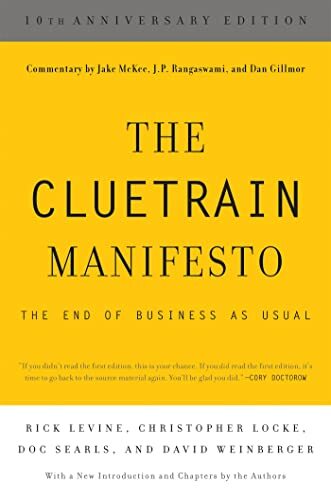
This book is dated. I’m guessing that when it came out in 2000 (and the website that inspired it in 1999), it might have been groundbreaking, but now, with 17+ years of Internet usage behind us, almost everything in the book seems obvious or naive, and it’s not worth reading.
I read the 10th anniversary edition of the book, which has a ridiculously long foreword from each of the authors. The intro is almost as long as the rest of the book, which is a bad thing, because the intro seems to meander randomly from topic to topic: chocolate, marketing, look how amazingly prescient we were, Obama, Internet, Gore, Oprah, Maslow. Bleh.
The rest of the book is a mix of platitudes that feel hollow and over-simplified, with occasionally interesting predictions. Some of these predictions turned out to be correct, such as the desire for people to be social online and the importance of corporate intranets, and some turned out to be laughably false, such as the idea that only authenticity works in marketing (despite countless examples of crappy companies becoming extremely successful by fooling consumers).
The biggest issue is that, despite the book’s insistence on the importance of storytelling, there are very few actual stories in the book itself. It’s too high level, with few concrete examples. It’s also very, very repetitive: Here’s the summary: “Internet is good. Top down management is bad. The web will set you free. Use your voice.” Repeat that about 1,000 times, and you’ve got the gist of the book.
In short, you’re probably just better off skipping the book and just doing a quick scan of the website.
Quotes
As always, I saved a few good quotes as I read:
Markets are conversations.
In just a few more years, the current homogenized “voice” of business—the sound of mission statements and brochures—will seem as contrived and artificial as the language of the 18th-century French court.
The customers who once looked you in the eye while hefting your wares in the market were transformed into consumers. In the words of industry analyst Jerry Michalski, a consumer was no more than “a gullet whose only purpose in life is to gulp products and crap cash.” Power swung so decisively to the supply side that “market” became a verb: something you do to customers.
There is no demand for messages. The customer doesn’t want to hear from business, thank you very much. The message that gets broadcast to you, me, and the rest of the earth’s population has nothing to do with me in particular. It’s worse than noise. It’s an interruption. It’s the Anti-Conversation.
We learn a lot about the voices we hear through their humor. Having a sense of humor tells us that you have some distance from yourself and the dreadful seriousness of your concerns. It is, in most cases, a prerequisite for personal authenticity—if you’re not laughing at yourself, are you really being honest about yourself? After all, you are—like all of us—a ridiculous creature.
A veterinarian using TechnoLatin might say that a dog serves as a platform for sniffing, is an open environment for fleas, and that it supports barking.
